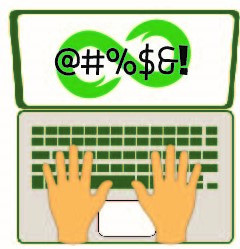The boundaries of free and hate speech online

Graphic illustration by Alara Dasdan
Where do we draw the line when it comes to free speech in the First Amendment?
October 2, 2019
Throughout history, the U.S. has held steadfastly to the Constitution and Bill of Rights; the First Amendment, in particular, has driven the direction of our nation’s moral compass. Many have debated where to draw the line when it comes to free speech in the First Amendment. This discussion has extended to its application in the Internet, with disagreements over where the boundaries of mediums such as social media and free expression websites lie.
The First Amendment prevents Congress from making laws that abridge the freedom of speech and the freedom of the press. Exceptions to this are obscenity — speech that is openly offensive or sexual — speech integral to illegal conduct, true threats and speech that incites imminent lawless action, among others.
“There are consequences to [free] speech, and although I understand that, by limiting speech, we risk limiting it too much and then, inevitably, taking away those rights,” senior and Intersections President Sarah Sotoudeh said.
But these constitutional premises apply only to the U.S. government, not to corporations; thus, corporations are not required to uphold free speech. The imageboard website 8chan, also known as Infinitechan or Infinitychan, has recently been embroiled in controversy over the absolute manifestation of free speech.
“The Supreme Court told us in Reno v. ACLU, which was the seminal First Amendment case from the mid-90s, that there is no reason to put additional restrictions on online speech,” said Daphne Keller, director of intermediary liability at the Stanford Center for Internet and Society. “At some level, having the internet permit information to flow in a way that no government gets to constrain is in our long term interest.”
On Aug. 3, 2019, Patrick Wood Crusius opened fire inside a Walmart in El Paso, Texas, in an act classified by police as domestic terrorism. The shooting resulted in 22 deaths and 24 injuries. Shortly after the attack, police discovered a four-page manifesto, posted by Crusius on 8chan, titled “The Inconvenient Truth,” which justified the mass shooting; in it were racist, anti-immigrant sentiments aimed at Mexican immigrants in Texas. 8chan users were allowed to post on the forum anonymously and without censorship, forcing Americans to reevaluate whether and where free speech ends.
This is not the first time 8chan has been the subject of controversy; in the past, there have been several instances in which the site was linked to alt-right ideals, racism, anti-Semitism, hate crimes, child pornography and multiple other mass shootings. Despite all of its controversial connections, however, 8chan has stuck to creator Fredrick Brennan’s vision of a “free-speech-friendly” imageboard, and preserved its users’ rights to express their opinions.
Brennan himself resigned in July 2016, citing disillusionment with what 8chan had become. A few days after the El Paso incident, the site’s provider, Cloudfare drew back their support to the website due to the controversy surrounding the incident. Since it was especially hard to find a provider after the shooting, the new president, Jim Watkins, moved 8chan to the dark web. This means that the site would no longer be able accessible through normal search engines such as Google. The site, due to the extreme values of user base, has continued to grow, ranking within the top five thousand most used websites in the world.
There is controversy surrounding what is acceptable to say online and in-person.
“When we’re online, we adopt a different persona from the one we have in person,” junior Shirley Li said. “As for 8chan, if a user says something that implies that he or she is actually going to break the law, there should be an investigation into that because someone saying that he or she will do something might imply that he or she has the intent to do it.”
As seen in the controversy surrounding 8chan and the First Amendment, there is much debate over where online boundaries should lie as the world becomes increasingly technologized. Entering these unfamiliar waters, it is vital for citizens to hold each other — and most importantly, the law — accountable for their online rights.



































































